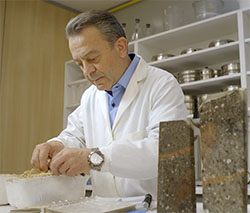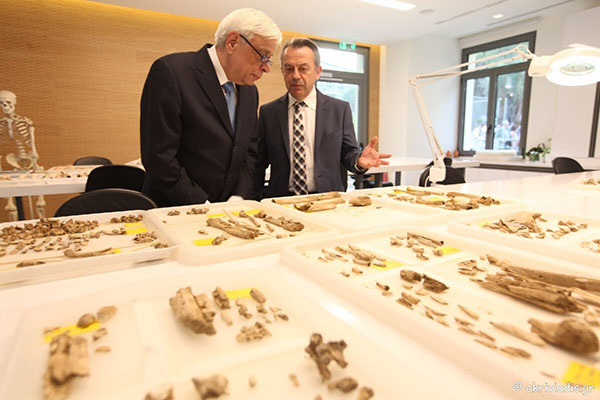Panagiotis Karkanas Elected to American Academy of Arts and Sciences

The American Academy of Arts and Sciences (AAAS), one of the U.S.’s oldest and most esteemed learned societies, has elected Dr. Panagiotis Karkanas, Director of the Wiener Laboratory for Archaeological Science at the American School of Classical Studies (ASCSA), to its 237th class of members. Karkanas is one of 40 Foreign Honorary Members to be elected to the Academy this year, adding his name to an elite list of 4900 Fellows and 600 Foreign Honorary Members who have been inducted since the Academy was founded by John Adams in 1780. Karkanas is currently the only Foreign Honorary Member living in Greece.
The 228 members of the Class of 2017 will be inducted at a ceremony on October 7, 2017, in Cambridge, Massachusetts. Karkanas is not only being recognized for overall excellence in his field, but is also being called upon to “produce useful knowledge” and to collaborate on multidisciplinary projects that address critical challenges—approaches Karkanas has advocated throughout his career, including in his leadership of the Wiener Lab.
Panagiotis (Takis) Karkanas has directed the American School’s Wiener Lab, the leading research facility for archaeological science in Greece, since 2014. He holds a Ph.D. in Geology from the University of Athens, and spent 20 years with the Ephoreia of Palaeoanthropology-Speleology in Greece’s Ministry of Culture. Karkanas has conducted geoarchaeological field work spanning several periods in Greece, South Africa, China, Israel, France, Spain, Hungary, Albania, and Cyprus. He is the author or co-author of over 100 scientific papers or chapters (more than 70 in top peer review journals) and 60 oral presentations and posters. Research interests of Karkanas’ include site-formation processes, palaeoenvironmental reconstructions, paleoclimate, and techniques and methods related to petrography, mineralogy, sedimentary analysis, chemical analysis, and provenance studies. Karkanas has contributed to major projects funded by the National Endowment for the Humanities, the National Science Foundation, the National Geographic Society, and the European Research Council. He has served on the Editorial Boards of leading journals Geoarchaeology and the Journal of Human Evolution.

Director Karkanas discusses the Lab's work in progress with the
President of the Hellenic Republic, Prokopis Pavlopoulos.
James C. Wright, Director of the American School of Classical Studies, praises the fine points and creativity of Karkanas’ work: “He is internationally recognized for his innovative work in micromorphology—the analysis of soil deposits at a microscopic level—because of his focus of how they can be related both to anthropogenic and natural activities. His work is innovative both in the application of methods and the diversity of contexts with which he works.” Wright welcomes the news of Karkanas’ election to the Academy by stating, “The American School of Classical Studies at Athens is proud to have him as the Director of its renowned Malcolm H. Wiener Laboratory for Archaeological Science. His election to the American Academy of Arts and Sciences recognizes Dr. Karkanas’ achievements, his active role in integrating science and archaeology, and the high international esteem of his colleagues.”
Melinda A. Zeder, Senior Scientist at the Smithsonian National Museum of Natural History, Chair of the Committee on the Wiener Laboratory, and an American Academy Fellow herself (2008), concludes, “This is a real reflection of Takis’ accomplishments and recognition within the scholarly community.”
Karkanas is the 24th person in the ASCSA’s venerable history to receive this honor. A press release and list of new members can be found on the Academy’s website.
-------
Founded in 1780, the American Academy of Arts and Sciences is one of the country’s oldest learned societies and independent policy research centers, convening leaders from the academic, business, and government sectors to respond to the challenges facing the nation and the world. Current Academy research focuses on education, the humanities, and the arts; science, engineering, and technology policy; global security and international affairs; and American institutions and the public good. The Academy’s work is advanced by its elected members, who are leaders in the academic disciplines, the arts, business, and public affairs from around the world.
The American School of Classical Studies at Athens is one of the world’s leading research and teaching institutions dedicated to the advanced study of all aspects of Greek culture from prehistoric times to the present. A consortium of over 190 North American colleges and universities, the School supports a multidisciplinary approach to Hellenic studies, encompassing the fields of archaeology, anthropology, the archaeological sciences, topography, architecture, epigraphy, numismatics, history, art, language, literature, philosophy, religion, and cultural studies. It carries out this work by training young scholars, sponsoring and promoting archaeological fieldwork, providing resources for scholarly work, and disseminating research.
The ASCSA’s Wiener Laboratory for Archaeological Science is the leading research facility in Greece for bioarchaeology, geoarchaeology, archaeobotany, and zooarchaeology, providing both American and international scholars tools, resources, and fellowships to answer a variety of scientifically-based questions.